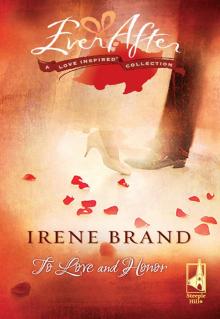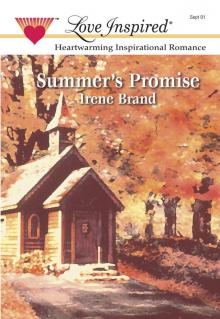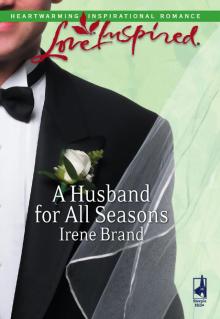- Home
- Irene Brand
The Test of Love Page 2
The Test of Love Read online
Page 2
“I know Dr. Melrose well. He’s sent several patients to us, including his own son. He was pleased with his son’s progress.”
“I expected a conventional health center, not a religious spa,” Joseph said bitterly. “I don’t have time to go to worship services every day. I’ve been away from my ranch off and on for months, and with summer coming, I need to be at home. How long do you think this will take?”
“I’m not a miracle worker, and if you expect me to use some mysterious hocus-pocus to bring about your healing, you may as well leave. God is important in the healing process, but it takes exercise, rest, proper diet, as well as spiritual commitment, to achieve a complete cure, and that takes time.”
“I’ve just explained to you that I don’t have much time,” he said tersely, then he laughed. “We’re going in circles, Miss Harmon. Someone has to budge, and since I’m the one asking for help, I guess I’ll have to do it. What do you want me to do?”
“I’ll take you on a tour of our facilities so you can see what we have to offer. Our physician will give you a brief exam, and you can fill out an application. We’ll need a copy of your recent medical records, too. Our review board will study your case and decide if we can give you the help you need. If so, we’ll assign a personal trainer to work with you and help implement a daily exercise program.”
“Do you know how long it will take?”
“Lacking any medical details of your injury, except what I’ve observed, I’d guess at least three months.”
He shook his head and gritted his teeth, but he controlled his anger. “All summer!”
“We don’t make prisoners of our therapy patients, but we do expect them to stay here five days a week, and they go home on weekends if they’re able. Those who live at a distance often stay until their program is completed.”
“My ranch is a hundred miles from here, and I’d have to go home periodically to oversee the work. My sister lives nearby and checks on the place every few days, but there are some decisions she can’t make.”
“Let’s take a tour of the buildings now, and you can see what we have to offer. We have golf carts available for our patients to travel if they aren’t able to walk. Are you up to walking?”
He grunted painfully as he got out of the chair. “I walk as much as possible, but I’m slow, and after a short time, I have to stop to rest.”
“We can take all morning because I don’t have an appointment until this afternoon. Let’s go.”
They went first to the gymnasium, located near the administration building. In general, Connie stayed away from the gym as much as possible to avoid Ray Blazer, the manager of the exercise rooms, but since she found it expedient to dispense with unpleasant encounters as quickly as possible, she started the tour there.
The gym provided the best exercise machines available. She and Joseph paused at the door of the fitness room to observe, and avoid the walkers who circled the indoor walking track, either cooling down after workouts, or getting their adrenaline pumping before strenuous exercise.
One elderly woman waved to Connie and rushed on. Amusement spread across Joseph’s face as he observed the lady circling the track in a slow trot.
“Isn’t she a little old for this activity?” he asked.
“Not at all. Della Sinnet is in her eighties, but she’s a regular fixture around here,” Connie said. “Her home is in Colorado Springs, but she spends her winters in a warmer climate. She comes to NLC for several weeks each spring, and she challenges all of us with her vitality.”
“So you have patients of all ages,” Joseph said as he observed the activities—people on treadmills, stationary bikes, stair-steppers, rowers and skate machines. In spite of the busyness, the atmosphere appeared calm, for quiet, classical, inspirational music wafted through the rooms. Videos provided soothing scenes of sunsets, towering trees, placid lakes, tranquil oceans and animals playing with their little ones. The room conveyed a pleasant feeling of exercising in the great outdoors.
Joseph followed Connie into the free-weight room where men and women worked on the equipment, seemingly without effort. “It’ll be a long time before I’m ready for this equipment,” he muttered.
“Not as long as you might think,” Connie said. She beckoned to a young man, who was coaching a woman on the horizontal calf raise machine. He ignored Connie for several minutes as he continued his instructions, then he sauntered toward them. Ray Blazer was a good advertisement for his profession. He had the build of a wrestler, and he kept in shape by exercising two hours each day on the free-weight machines.
“Mr. Caldwell, this is Ray Blazer, manager of the gym and an expert on physical fitness. He’ll explain the various equipment to you. I’ll be on a treadmill while Ray gives you a tour of our exercise facilities.”
A patient stepped off a treadmill and moved to a modified leg stretch machine, so Connie got on the machine and adjusted it to her pace. She faced the weight room, so she’d know when Joseph was ready to leave. Ray moved from one machine to another explaining their various functions to Joseph.
Although Ray was an expert in his field, Connie wished he’d leave NLC. She’d been engaged to Ray until two months ago, and her disappointment in him still burned in her heart. When Ray came to the Center a year ago, it seemed the perfect situation—she could combine her work and romance. She’d thought she loved Ray, but when he disregarded her moral principles, which he’d known about before their engagement, she broke the engagement. But though she tried to avoid being alone with him, she couldn’t drop him from her staff, and it presented a problem.
When Joseph limped in her direction, Connie stepped off the treadmill. “I must sit down,” he muttered. “This leg gives me fits when I’m on it too long.”
“That’s understandable,” Connie said. “Let’s sit on the bench in front of the building, so we can enjoy the sunshine and fresh air.” He held the door open for her, then he eased onto the bench with a deep sigh and closed his eyes.
Joseph breathed heavily, and pain etched deep lines on his face. Sitting beside him, their shoulders touching, Connie had the urge to run her fingers through his finely textured hair, and to wipe away the pain reflected on his face—an emotion that surprised her so much, she leaped to her feet and leaned against the building. When Joseph opened his eyes, he said, “I might as well go home, accept the fact that I’m handicapped, and learn to live with it. I’ll never be able to manage those exercise machines.”
“It’s normal for you to feel like that. I pointed out Della Sinnet to you. She came to us using a walker soon after NLC opened. She’d had two hip replacements. None of us were optimistic about helping her, and there were days when she cried in frustration. After only a few minutes on the treadmill her body hurt so much she had to stop. But Della believed that ‘with God, all things are possible,’ and she kept at it. Slowly, we began to see progress, and the day that Della climbed Faith Mountain, we had a party.”
“Faith Mountain? I’ve never heard of it.”
Connie laughed. “Not many people have. It’s a hill on our property, several hundred feet higher in altitude than we are here, but it’s a steep climb to the top. When one of our patients is able to scale that hill, we know they’ve just about recovered.”
“If an eighty-year-old can make it, perhaps I can, too. I’m ready to continue the tour,” Joseph said, struggling to his feet.
They checked out the pool area and the aerobic room, where exercises were in progress, before they reached the cafeteria.
“It’s a little early, but let’s have lunch anyway. You’re our guest today, Joseph. Incidentally, we use first names at NLC.”
“All health foods, I suppose,” Joseph said, a twinkle in his gray eyes, as they entered a brightly decorated room that could seat fifty diners.
“All our meals are designed with health in mind, but we believe moderation is the key to good living, so the cooks provide occasional treats,” Connie said as she directed Joseph to a
small table beside a window. “There’s a buffet in the evening, but we order from a menu for breakfast and lunch.”
When they were seated, she took two menus from the rack and handed one to him. “Our sandwiches are served on whole wheat or rye bread, and everything is low-cal as much as possible. If you want a hot meal, I’d recommend the pasta dishes.”
“Please order for me. I haven’t paid much attention to my diet for several months. I don’t care what I eat.”
“Very well. We’ll have the pasta and chicken, a vegetable salad with tarragon vinegar and a bowl of mixed fruit. Spring water for our beverage.”
A waitress soon placed their meals before them, and Joseph attacked his food as if he hadn’t eaten for a month, surprised that his appetite had returned. He couldn’t remember when he’d been hungry. Appraising Connie obliquely, he wondered how much her presence contributed to his enjoyment of the meal.
Questioning what had happened to her appetite, Connie picked at her pasta. Habitually, she never left a morsel of food on her plate, but Joseph’s keen, appraising glances unnerved her. Remembering that electric moment in the office, she wondered if he sensed the attraction between them also. Finally, she pushed the pasta and salad aside and nibbled on the mixed fruit.
When the silence became unbearable, she directed the conversation to Joseph’s ranch, and they talked amicably while they ate.
“I went to college, intending to study ophthalmology, but, after a year, I knew I couldn’t spend my life tied to an office. Ranching was what I loved, so I changed my major to agriculture, which pleased my father. He was nearing retirement age, and he wanted me to take over the ranch.”
As Joseph described the changes he’d made at the ranch since his father’s retirement, he seemed to forget his physical and emotional problems. They’d just finished eating when the kitchen door opened and a plump, graying woman in her fifties approached their table.
Remembering what Kim had told her, Connie hoped this encounter wouldn’t embarrass Joseph, but when Rose stopped beside them, Connie said, “Mr. Caldwell, this is our head cook, Rose Nash—the one responsible for the good meal we’ve enjoyed. Rose, this is Joseph Caldwell. He’s looking over our facility today.”
“Oh, I know Mr. Caldwell,” she said.
Joseph looked up quickly, and rose awkwardly to his feet. His face registered astonishment, but not guilt or displeasure, as he shook Rose’s hand.
“This is a surprise, Rose! I didn’t know what happened to you after Mr. Perry died. I’m glad to see you. You’re looking—” he hesitated “—fit.”
Rose threw back her head and laughed heartily. “Don’t you mean fat? I try to eat the food Connie prescribes, but I’d overindulged too long before I came to NLC. She hasn’t given up on me yet—I’ve only been here a year.”
“Sit down, Rose,” Connie invited. “You probably need a break.”
Rose took the chair between them, explaining, “Connie, I was employed by Mr. Caldwell’s in-laws for several years.”
“And I remember all the good food you served us,” Joseph said.
“Like that chocolate-pecan pie you liked so well?” Favoring Connie with a mischievous glance, Rose said, “I brought a big box of recipes from the Perry home. If I can find the directions for that pie, I’ll bake one for you.”
“That will definitely be a factor in my decision. I’ll keep it in mind.”
Connie listened silently while Joseph and Rose talked about the Perrys, and the childhood of Virginia and George, her brother. The conversation was lighthearted until Rose stood up. “Time for me to go back to work. It’s almost noon, and I’ll be busy. It’s good to see you again, Mr. Caldwell. I’m sorry you and George are having problems—you were always such good buddies.”
A somber expression clouded Joseph’s face, and he said stiffly, “I’m sorry, too, but I suppose he’s doing what he thinks is right.”
Leaving the dining room, Connie noticed that Joseph walked with increasing difficulty, and she pointed to a golf cart parked nearby. “Let’s take the rest of the tour on wheels, for I have an appointment in about an hour.”
She wanted to save his pride by suggesting the cart was for her benefit, but when he put his arm on her shoulder for added support as he eased into the seat, a little twinge of excitement flowed into her heart. It’s high time you get your emotions under control, she admonished herself sternly. But she wasn’t sure her heart received the message.
Chapter Two
NLC was located on a thirty-acre tract of land in a remote valley. The facility had been built for a convention center, but when the firm that owned the center failed, Connie bought the place. What had once been a forty-room motel turned into a dormitory for residents. If they preferred, patients could lodge in one of ten two-room rustic cabins. NLC had a well-equipped kitchen and spacious dining area, and an inside Olympic-size pool with sliding doors, which opened during the warm season to give the illusion of outdoor bathing.
Connie drove past the small chapel, the dormitory, the shaded area by the creek where the log cabins were located and along a few of the walking trails.
Returning to the administration building, she said, “Our physician has his offices here, and he’s on campus two days each week. You’ll need to see him for a brief exam. He checks each of our patients weekly, so he’s busy, but I think he’ll be available today.”
“What’s my next move? When will you tell me if I’ve been accepted?”
“Our advisory board meets tomorrow evening, so if you’ll come back or telephone midmorning two days from now, I’ll give you an answer. A client is assigned to a personal trainer, chosen according to the workload of the employee. If the trainer and patient aren’t compatible, we make another assignment.”
Connie accompanied Joseph to the reception room of Dr. Ron Alexander. Peggy McCane, the nurse, said the doctor could see him within the hour. Tall, lanky Peggy had been at the Center for over a year, and she was Connie’s jogging partner. Since her broken engagement two months ago, Connie no longer ran alone.
“I’ll leave you now, Joseph. You’re in good hands with Peggy and Dr. Alexander.”
Joseph shifted his cane to his left hand and shook hands with her. Candidly, he said, “I should warn you, Miss Harmon, I’m a cantankerous patient—you may want to take that into consideration during your staff conference.”
She returned his grasp, noting that his fingers were strong and capable, but quickly disengaged her hand, unprepared for the tingling sensation triggered by his touch. The more difficult Joseph was, the less likely she would be to succumb to his charm. If he compelled her admiration when he winced with pain at every step, she couldn’t imagine how attractive she’d find him when he was physically fit. When she’d once watched his rodeo exhibition, Connie had been impressed with the suppleness and grace of his body, and she’d never forgotten his superb performance. Yes, it would definitely be more beneficial to her peace of mind if Joseph was a disagreeable patient.
“That won’t make any difference. We don’t shy away from difficult cases—they present a challenge. We’re dedicated to meeting the needs of our patients at their level. Bye.”
With a wave of her hand, Connie sprinted down the hall to her office. She was next in line on the staff to take a new patient. Should she decline to work with Joseph? She had no doubt that he would demand all of her therapy skills before he achieved complete mobility, but that didn’t worry her. She’d never doubted her skill as a therapist, yet she did question her ability to deal with Joseph without becoming personally involved with him. She’d had no trouble in the past staying on an impersonal level with her patients. Would working with Joseph challenge her self-control?
After Joseph left the doctor’s office, he got into his pickup to return to the ranch. His troubled mind superceded his eagerness to get home, so instead of heading toward the interstate and a quick trip to the ranch, he turned northward on a narrow, winding road through the mountains. After s
everal miles, he stopped at an observation point that provided an unobstructed view of Long’s Peak.
The encounter with Rose Nash had flooded his mind with memories that he wanted to forget. In spite of the suspicions of his brother-in-law and the police, he hadn’t killed Virginia, but had his actions driven his wife to her death? If he could rid himself of the guilty feeling that he’d indirectly caused her to die, he thought he could regain his physical health.
He’d fallen in love with Virginia at their first meeting. Their whirlwind courtship had soon led to a proposal, and he couldn’t believe his good fortune when she’d wanted to marry him.
They’d been deliriously happy for the first year, but Joseph had become disillusioned when he’d realized they had very little in common. His wife had detested his rural lifestyle, while he’d resented the money showered on Virginia by her parents—money that enabled her to spend winter months in Florida or California with the friends she’d had before they were married.
Joseph wasn’t good at pretense, and when his love dwindled, he could no longer treat Virginia with the affection she craved. When she’d wandered away, he’d done nothing to prevent it.
When his love for Virginia had been at its peak, he realized that his regard for God had sunk to its lowest ebb, and when he’d no longer loved her, he was still out of fellowship with God. Once the close relationship with his wife and with God was gone, he didn’t know how to regain either of them.
Joseph stepped out of the truck, and leaned against the stone barrier at the edge of the precipice. From his pocket, he took out a New Testament that a chaplain at the hospital had given him. When Joseph had complained that God seemed so far away, the chaplain had answered, “God hasn’t moved—you have,” and he’d quoted a verse from the writings of Solomon. “‘I know that everything God does will endure forever.’ Once you’ve trusted God for your daily provision and your eternal salvation, it’s a done deal. Your affections may wane, but God is always there—faithful and steadfast.”

 Love Finds You in Valentine, Nebraska
Love Finds You in Valentine, Nebraska To Love and Honor
To Love and Honor A Family for Christmas
A Family for Christmas Christmas in the Air
Christmas in the Air Summer's Promise
Summer's Promise A Life Worth Living
A Life Worth Living Made for Each Other
Made for Each Other A Husband for All Seasons
A Husband for All Seasons A Love to Treasure
A Love to Treasure The Sound of Secrets
The Sound of Secrets Love Finds You Under the Mistletoe
Love Finds You Under the Mistletoe Autumn's Awakening
Autumn's Awakening Song of Her Heart
Song of Her Heart The Test of Love
The Test of Love Yuletide Stalker
Yuletide Stalker Tender Love
Tender Love Listen to Your Heart
Listen to Your Heart Yuletide Peril
Yuletide Peril